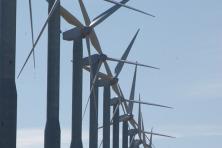As this summer’s record temperatures, drought, and wildfires remind us, Oregonians have a lot more work ahead of us to protect the health and well-being of this incredible state we call home. The 2015 Oregon legislative session concluded last week, and the outcomes for climate were decidedly mixed. We saw important wins on clean fuels and strong momentum for limiting and pricing carbon, but little progress on transitioning Oregon’s power supply from fossil fuels to clean energy. Oregon moved forward on climate this session, and we’ve got to keep moving.
Our Legislature made great progress early in the session, lifting the sunset on the Clean Fuels program and ending the oil industry’s monopoly over fuel choices in Oregon. The program will lower carbon pollution from transportation fuels in Oregon by 10 percent over 10 years by requiring oil companies to blend low-carbon biofuels, or to purchase credits that support electric vehicles and other cleaner fuel alternatives. Late-session efforts to pit a transportation package against clean air and roll back the Clean Fuels program were unsuccessful thanks to your letters and calls, an thanks to a strong show of leadership in Salem standing up to Big Oil. Oregonians deserve good roads and safe air, and should not have to choose between them.
This session, advocates of climate progress built momentum for limiting greenhouse gas emissions in Oregon and accounting for the true costs of climate pollution. Thanks to standing-room only hearings in both the House and Senate, and enthusiastic letters and testimony in support by the business community, communities of color, public health advocates, students, faith leaders, and others, the Climate Stability and Justice Act (HB3470-1) is well-positioned for success in future sessions. The bill would enforce Oregon’s existing greenhouse gas reduction goals and require the state to design and implement market-based mechanisms to achieve the needed reductions. Holding polluters accountable and capping emissions remains one of Climate Solution’s top priorities.
Oregon missed an important opportunity this session to speed our transition to a clean energy economy. The Coal to Clean bill (SB 477) would have required Oregon utilities to transition coal from Oregon’s electricity supply by 2025 and replace it with clean energy; but the bill failed to move forward. Oregon’s continued reliance on coal power is a significant obstacle to reaching our statewide climate goals. If the problem is not addressed soon, Oregon risks falling further behind other states in developing clean and reliable power sources. Climate Solutions continues to prioritize the acceleration of coal transition, energy conservation, and renewable energy development in Oregon.
Here is a short summary of how other climate and clean energy bills that Climate Solutions supported fared this session:
· HB 2092: Establishes a Zero-Emission Incentive Fund to auction tax credits to fund rebates for purchases of zero-emission or alternative fuel vehicles.
Status: Died in committee
· HB 2585: Allows lot owners in planned communities and condominium unit owners to install and use electric vehicle charging stations for personal, noncommercial use.
Status: Passed into law
· HB 2193: Directs electric companies to procure one or more energy storage systems that have capacity to store specified amounts of electricity. (This creates opportunities to integrate increasing amounts of renewable energy into Oregon’s electric grid.)
Status: Passed into law
· HB 2447: Extends the sunset on the Residential Energy Tax Credit (RETC) so this program can continue to incentivize residential alternative energy devices, including residential solar.
Status: Died in committee
· HB 2632: Directs Oregon Department of Administrative Services to establish a program to incentivize electricity generation from utility-scale solar energy projects in Oregon.
Status: Died in committee
· HB 2941: As amended, requires electric utilities to provide a portfolio of rate options to their residential customers that includes an option for electricity associated with specific renewable energy resource, including solar PV systems.
Status: Passed into law
· HB 2216: Supports the development of off-shore wind production in Oregon.
Status: Died in committee
· HB 3344: Increases Renewable Energy Tax Credit for solar water heaters from $.60 to $2.00 per annual kWh of energy production.
Status: Died in committee
Climate Solutions wants to recognize and thank the hard work and dedication of our partners and community allies who have worked alongside of us to advance climate and clean energy policy in Oregon. We also want to recognize the diligence and leadership of the legislators in Salem who helped move Oregon forward this session.





